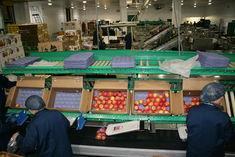

As Worldwide Fruit (WWF) officially opened its packhouse and office facilities in Spalding last Friday, managing director Robert Balicki said the company has recovered from a “nightmare” few months and retains a solid financial foundation for the next chapter in its colourful history.
“There have been a lot of rumours put about that Worldwide Fruit is not financially strong enough to continue; that is absolutely not the case,” he said.
“I am constantly being asked about the future viability of the company, and there is no denying it has been a nightmare last few months. We lost almost £6 million on the Fruit First deal, and that is taken account of in our latest annual accounts, which obviously look fairly sick as a result. But it is a non-recurring loss as a result of a poor investment.”
Balicki said that, with the benefit of hindsight, the concept of Fruit First - as a site driven by robotics to optimise efficiency through the supply chain - was a good one, but proved in his opinion “one step too far” for the UK at this stage of the industry’s evolution.
“There were a lot of growers who were entitled to feel let down very badly [by the Fruit First episode]. However, at the end of it all, no grower money has been lost, and growers were able to consolidate their returns,” he said. “I obviously share a certain amount of responsibility, but it got to the point that it was obvious it could not be turned around, and I could not recommend [continued involvement] to our board.”
WWF was faced with huge operational challenges at the height of the site’s problems in March, admitted Balicki. “We were locked out of the office in Kent without warning and had to relocate our team [which now has a permanent home again in Whitstable]. But we only lost one order, and the results we achieved under that level of pressure are a credit to everyone involved.
“We have received fantastic support from our shareholders and throughout our grower base, as well as from the WWF team.”
New Zealand’s T&G and the UK’s Northcourt are joint owners of WWF, and growers from both countries have rallied around, maintaining their supply through the system and making additional packing facilities available to handle volume that was programmed to go through the Fruit First site before it went into receivership.
Packing facilities at the farms of growers Ian Johnson, Paul Mansfield and Clive Baxter all took on additional volume, and the Spalding site, which came on stream in January principally to handle pre-ripened avocados and pears, also packed more apples than was initially planned.
“I believe we are a stronger company for it,” said Balicki. “We are forecast to make £1.6m operating profit in 2008 and the indications are that will rise to £2m in 2009 and £2.5m by 2013.”
Next season’s northern-hemisphere top-fruit packing programme for WWF is already in place, with the aforementioned farms the three main packing centres for fruit. “We know which growers’ fruit is going to which packhouse and all of our customers know where their fruit will be packed,” said Balicki. “We’ve come through a very challenging period, but we will not have to address the issues of last season again.”
There remains the possibility that WWF could market fruit that is packed at the Fruit First site, which is back up and running, in the future. “There are raw nerves, that cannot be repaired quickly. But we are willing to market the fruit of growers who use the Fruit First site. I’ve learned never to say never in this business,” said Balicki.



